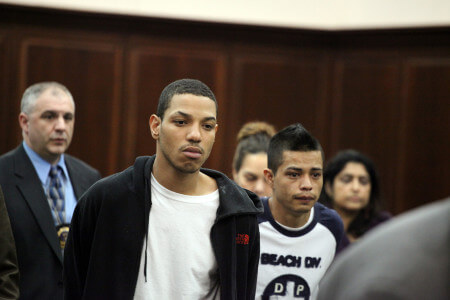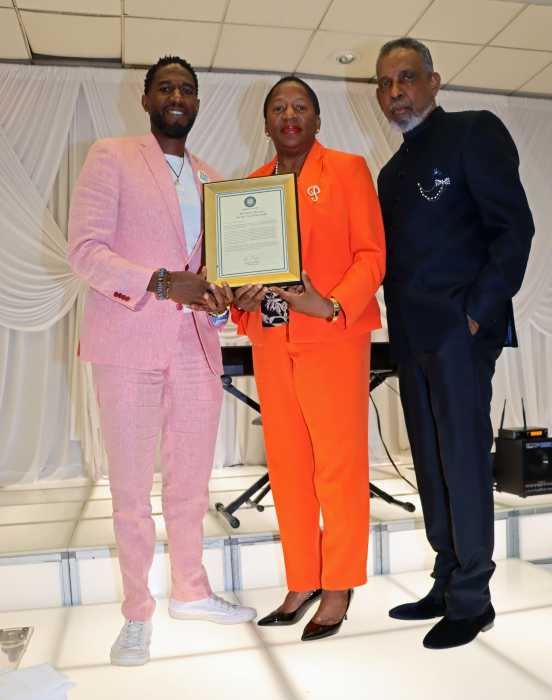BY DUNCAN OSBORNE | As the trial of the accused killers of John Laubach opened in Manhattan Supreme Court, the prosecution charged that Edwin Faulkner and Juan Carlos Martinez-Herrera acted recklessly or with depraved indifference when they bound the 57-year-old gay man and covered his face with the duct tape that caused him to choke to death. The defense asserted Laubach’s death was an accident that occurred during rough sex.
“His original plan was to attend the birthday party of a friend, but instead he was kidnapped by these defendants,” Lanita Hobbs, the assistant district attorney who is prosecuting the case, told jurors during opening statements on September 28.
Laubach was found dead in his Chelsea apartment on March 2, 2012. His hands and feet were tied and his apartment had been ransacked. The prosecution case is that Laubach, Faulkner, and Martinez-Herrera had an ongoing relationship that turned sour when the gay couple began stealing from Laubach. He and a friend, Hiram Lopez, had banned Faulkner, 33, and Martinez-Herrera, who will be 35 on October 1, from Laubach’s home. They returned, tied Laubach up, and stole from him, Hobbs said. The couple fled to Florida where they were arrested on March 15 of that year still holding many of Laubach’s possessions.
Attorneys for Edwin Faulkner, Juan Carlos Martinez-Herrera concede their clients are hustlers, thieves, but not murderers
The two are charged with second-degree murder in that they acted with depraved indifference, not that they intended to kill Laubach; felony murder, based on the assertion they caused Laubach’s death in the course of committing another felony; and kidnapping and robbery, the charges that form the basis for the felony murder charge.
Hobbs told jurors that the relationship was so bad that Laubach took to carrying a weapon.
“He had resorted to carrying a knife for his protection,” Hobbs said. “A few days later, he was dead.”
After discussing Laubach in terms that bordered on homophobic during jury selection, Hobbs painted a more sympathetic picture of the man in her opening statement. He was a floral designer who had suffered a stroke and still walked with a limp. While he paid younger men for sex, he also allowed them to store clothes and possessions in his home, take showers there, and sleep there.
When prosecutors and defense attorneys have information about a victim or client that they believe a jury will find objectionable, they often disclose that early in a trial so jurors are not surprised and might become inoculated to it.
“He was interested in teenagers,” Hobbs told prospective jurors on September 21. “He sometimes paid men for sex… You’re probably going to learn that he was promiscuous, you’re probably going to learn that he was attracted to younger men.”
A prosecution witness will testify that Laubach had sex with him when he was underage, Hobbs told jurors on September 28, and she alluded to that during jury selection. Hobbs also aggressively attacked the defense argument that Laubach died accidentally during kinky sex.
“This case is not about sex as the defense indicated to you during jury selection,” Hobbs said. “He was restrained in a manner that was inconsistent with consensual sex.”
While Faulkner gave a lengthy statement to police after his arrest, the jury is not going to hear that statement. The prosecution cannot use it because it creates what is called a confrontation problem.
Faulkner implicated Martinez-Herrera in the statement and the only way Martinez-Herrera could refute it is by calling Faulkner to the stand. The US Constitution bars compelling a defendant to give evidence against himself as Faulkner would likely have to do if he took the stand.
Without Faulkner’s statement, there is no eyewitness to any crime. During jury selection and in her opening, Hobbs told jurors that they would not learn exactly who did what in Laubach’s apartment.
“What we are going to do is give you the tools to make a reasoned assessment of what happened,” Hobbs said.
Prosecutors have the butcher knife that Hobbs said was used to cut the lamp cord that bound Laubach. That knife has Martinez-Herrera’s fingerprint on it. They also have a roll of duct tape that has both men’s fingerprints on it. They have video and cell phone records showing the couple repeatedly trying to use Laubach’s ATM card to take cash from his bank account. And they have recovered some of Laubach’s property that was pawned.
The defense gave shorter opening statements. They pressed the kinky sex defense and, using the jury inoculation strategy Hobbs employed, the attorneys for Faulkner and Martinez-Herrera readily conceded that their clients stole from Laubach, but that is all they did, they asserted.
“John Laubach died engaging in rough sex for which no one is responsible,” said Daniel Scott, the attorney for Faulkner, during his opening statement. “Edwin Faulkner may have acted negligently. He did not commit murder.”
During jury selection, Scott called his client “a hustler and a thief” and he told jurors during his opening, “All of the evidence of larceny will be virtually uncontested.”
Faulkner was on parole when Laubach died, and the defense may argue that the men fled what they believed was an accidental death because they feared that Faulkner would be sent back to prison.
“When you hear all the evidence in this case you will understand why what they did makes sense,” Daniel Parker, the attorney for Martinez-Herrera, told jurors.
Earlier in his opening statement, Parker said, “The evidence will show that Juan Carlos Martinez-Herrera did not rob, kidnap, or murder John Laubach… The evidence also will show that they are male prostitutes and petty thieves.”
Editor's note: In the original posting of this story, the photo was incorrectly identified as a court appearance in 2015. The photo is from 2012.

































